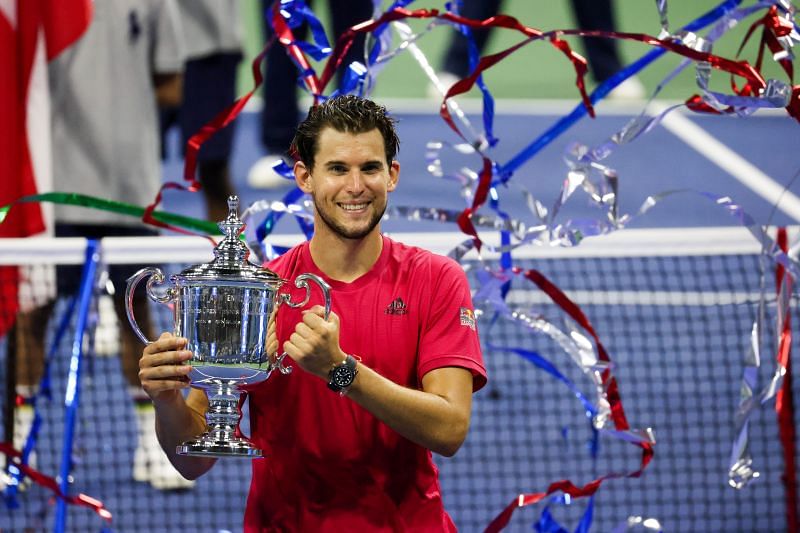
Dominic Thiem passes his final test with less than flying colors, but more than enough heart
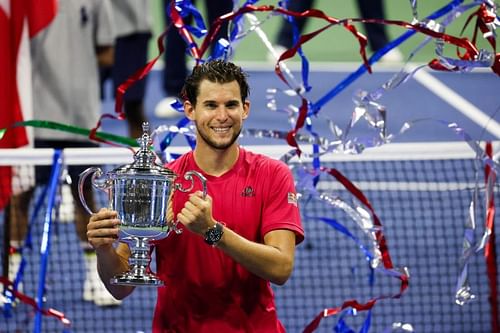
The last few months have been a 'testing' period for the world at large, both literally and figuratively. The coronavirus-enforced lockdowns and death tolls have tested the patience and resolve of millions, while simultaneously making them undergo painful COVID-19 tests at the drop of a hat (or a cough). And professional athletes haven't been immune to all this stress; just ask Dominic Thiem.
Right from the time he first voiced opposition to the pandemic-specific relief fund for lower-ranked players around six months ago, Thiem has been tested in a way that he's never been before. First it was his sense of empathy that was questioned, then it was his sense of responsibility (hello Adria Tour), and at one point it was even his resistance to the virus (in late June he was tested something like six times in 10 days).
When Dominic Thiem arrived in New York for the Cincinnati-US Open double-header, 'testing' was already the dominant theme around him. The USTA bubble required all players to undergo COVID testing regularly, and stay as isolated as possible from everyone that wasn't a part of their team.
But for Thiem there was a more personal test: could he step up when two members of the Big 3 were absent, and make good on all the world-beating promise he had shown over the past two years?
The first test, at the Western & Southern Open, ended in utter and abject failure. Dominic Thiem was so bad in his opening match against Filip Krajinovic, where he won a grand total of two points on his opponent's serve, that many were moved to demote him from the US Open contenders list immediately.
The newly laid courts at Flushing Meadows seemed too quick for the famously big-swinging Austrian; he just didn't seem to have enough time to unload on his groundstrokes. And with the claycourt season so close, it seemed entirely possible that he would just go through the motions for the rest of his time in New York.
There were even jokes about how he might tank one of his matches in the early rounds so that he could play his home tournament in Kitzbuhel.
But we should have remembered that Dominic Thiem has never been a back-bencher. He has always been a model student, the kind that sits right under the teacher's nose and enthusiastically raises his hand even if he doesn't know the answer.
Thiem is not someone who sleepwalks through his exams; he is the one who completes all his assignments on time and then asks if the class can be given more tests.
And that's how he went about his US Open campaign too. Dominic Thiem was never quite in his element during the fortnight, but he did what he needed to and repeatedly positioned himself at the head of the class, waiting for the next test.
Marin Cilic, Felix Auger-Aliassime, Alex de Minaur, Daniil Medvedev - they were all dealt with by sticking to the basics, and showing up in the biggest moments.
Then came the biggest test of all: a Slam final in which he was, for the first time ever, not the underdog. And Thiem wasn't just the favorite to beat Alexander Zverev; he was the overwhelming favorite. A poll by Tennis TV asking fans who would win saw Thiem get a whopping 81% of the votes.
It needs no mentioning that this was a sea change from Thiem's usual Slam finals. He had faced Rafael Nadal (twice) and Novak Djokovic in his previous three, and he was the distinct underdog each time.
How would Dominic Thiem handle this new kind of pressure, the expectation that he should win rather than he could?
The first couple of sets didn't present a very rosy picture. Thiem looked nervous from the get-go, making routine forehand errors and even untimely double faults. In sharp contrast, Sascha Zverev was playing like a man possessed; for the first hour the German looked every bit like the multiple Slam champion that many had pegged him to become when he first burst on to the scene.
Alexander Zverev - the man for the big occasion
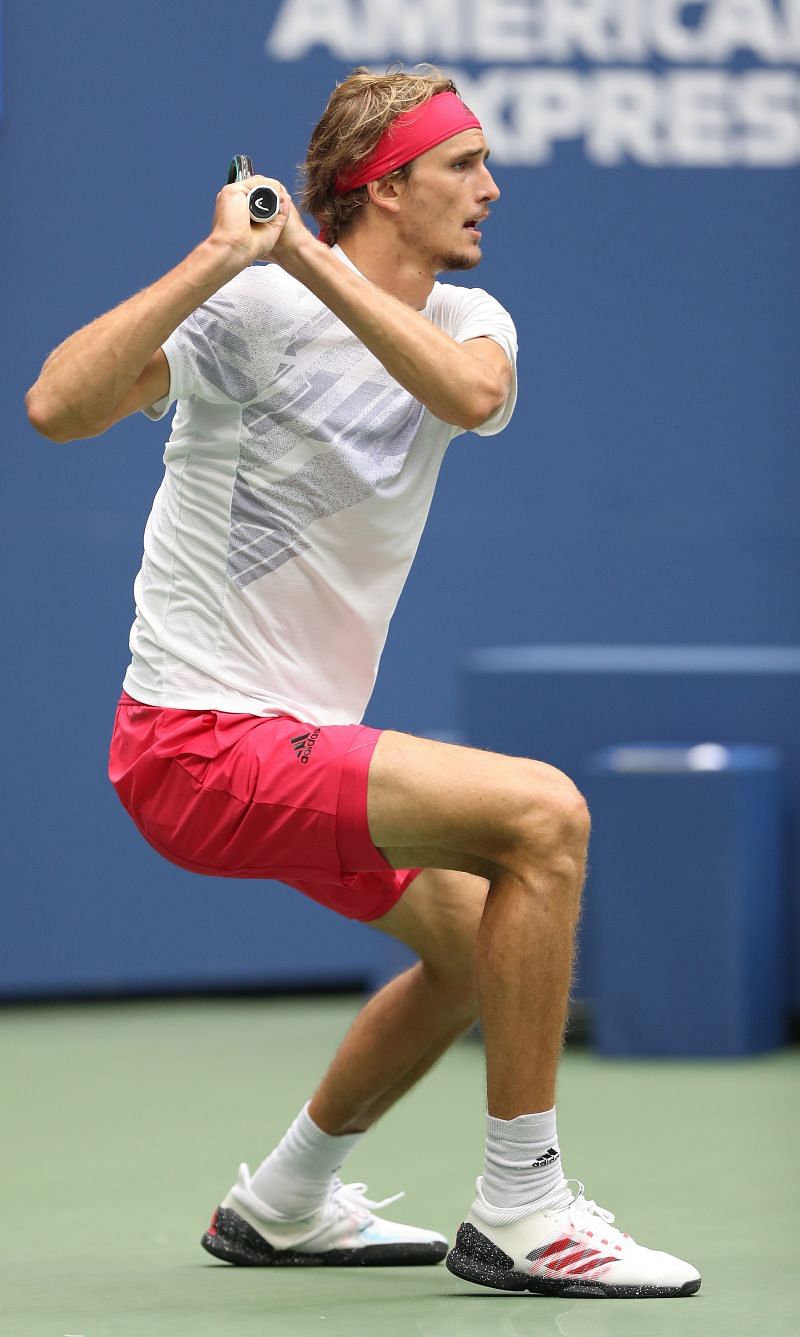
It was after the first set ended in a blur, 6-2 in favor of Zverev, that the magnitude of Thiem's job truly dawned upon everyone. This final hurdle would not only test his game, but also his heart. And in the early going, neither seemed up to the task.
A lot had been said about Thiem's hardcourt game in the buildup to the final, and how it was a sign of both progress and stagnation. On the one hand, he was using his first serve and backhand slice much more efficiently than in years past. But on the other hand, he was standing several metres behind the baseline while both returning and rallying.
Thiem took on the role of counterpuncher rather than aggressor against Cilic, Auger-Aliassime and Medvedev. And some thought it was fortunate he had escaped with the loss of just one set in those three matches.
In the first couple of sets against Zverev, Dominic Thiem's strategy seemed to be backfiring spectacularly. Not only was he unable to hit through Zverev with his roundhouse groundstrokes from well behind the baseline, but he was also being tugged around by the German's precise, on-the-rise hitting.
Zverev's backhand was on the money as usual, especially the down-the-line version, but even on the forehand wing he seemed to be outplaying the Austrian. And wonder of wonders, he seemed more in control of his second serve than Thiem. Each of those things was as shocking as anything that has transpired in 2020 - including COVID-19 and Novak Djokovic's default.
They say hindsight is 20/20, and perhaps we wouldn't be saying this if Thiem had lost, but his behind-the-baseline strategy may have been the single most important factor in his comeback.
The popular refrain about Dominic Thiem has always been that he's an all-or-nothing player; that his huge cuts make his groundstrokes prone to misfiring on an off day. And it was clear that Sunday was an off day for Thiem; nothing was working particularly well, least of all the topspin backhand.
But by positioning himself so far back he managed to avoid descending into an avalanche of errors, and that kept him in the contest.
Dominic Thiem's court positioning - the savior on a day of lackluster tennis
The mid-match slump from Zverev was almost inevitable; he knew it, we knew it, even the roaches on the streets of Manhattan knew it. So when the cringeworthy double faults and forehand errors arrived, the only question was whether Thiem would be stable enough to take advantage.
Again, we go back to Thiem's court positioning. Would he have been able to start the turnaround if he had kept mistiming his shots from the top of the baseline?
Free points were like manna from heaven around the third set, and Zverev would have gleefully lapped them up. But Thiem didn't give him too many free points; even when he mistimed the ball, he managed to keep it in the court by giving himself more room to work with.
The third and fourth sets were rather painful to watch, it has to be said. Thiem seemed to be waiting for Zverev to implode, and Zverev seemed only too willing to oblige. But even through that torturous period, it was clear that the base level of the two men was worlds apart - and that was what made the difference in the end.
Zverev at his best hits with easy power, moves with astonishing efficiency, and thunders down mammoth serves with ridiculous frequency. It is easy to see why those things will always have an advantage over Thiem on a quick court, even if the Austrian is playing at his best.
But what happens if both players are not at their best? Recent evidence suggests that the fundamentals of Thiem's game - heavy topspin, explosive footwork, once-in-a-generation kind of raw power - are easier to replicate than Zverev's timing and precision-based game. And that may have as much to do with the physical gifts of the two men as their level of self-belief.
Dominic Thiem managed to climb out of the hole he had dug himself into, because he kept backing himself and sticking to his guns. He trusted his shots when it mattered, pumping up the racquet-head speed on the biggest points, while at the same time Zverev backpedaled and decelerated.
And yet somehow, the German turned it around in the fifth. He not only recouped the early break (with an incredible down-the-line backhand pass to boot), but also broke at 4-3 by forcing Thiem to go for more. Zverev's net approaches and volleys towards the end were particularly impressive, and they seemed to have put him in a position from where he couldn't lose.
Dominic Thiem's physical issues seemingly had something to do with that too. He started cramping midway through the fifth set, and by the end of the match he could barely move to his backhand side. Relying almost exclusively on the slice, Thiem seemed to be hoping that Zverev would miss - a strategy fraught with danger even at the best of times.
But there was a way out even from this hole. After all the work over the last few years, after the three lost Slam finals, after the six matches in New York where he had ticked off all the boxes, Dominic Thiem had one final test: conquering his own inner demons. And I say 'inner demons' rather than 'physical issues', because that's exactly what it was.
As the man himself revealed in the post-match press conference, the 'injury' in the fifth set was almost entirely mental. There was nothing actually wrong with his body; the issues were all in the mind.
"I started little bit cramping at the end of the fifth. It was the first time since years and years that I was cramping. But I guess it was not physical cramps; it was mentally. I was super, super tight the whole day actually and then in the beginning of the match," Dominic Thiem said later.
In other words, it wasn't just a case of bad luck; it was a case of glorified choking. This wasn't something that could be attributed to living in the Big 3 era, or even to facing an opponent playing out of his mind. This was Dominic Thiem's own doing.
Fortunately for him, his good friend was on hand to help. Zverev got broken at 5-3 with some predictably poor shot selection, giving the Austrian a lifeline. But the match still seemed like the German's for the taking, given how little pace Thiem was being able to generate on his serve.
That's when the 27-year-old decided to finally show off the one thing that separates him from the rest of the crop: his unanswerable power off the ground.
The power of the Dominic Thiem forehand
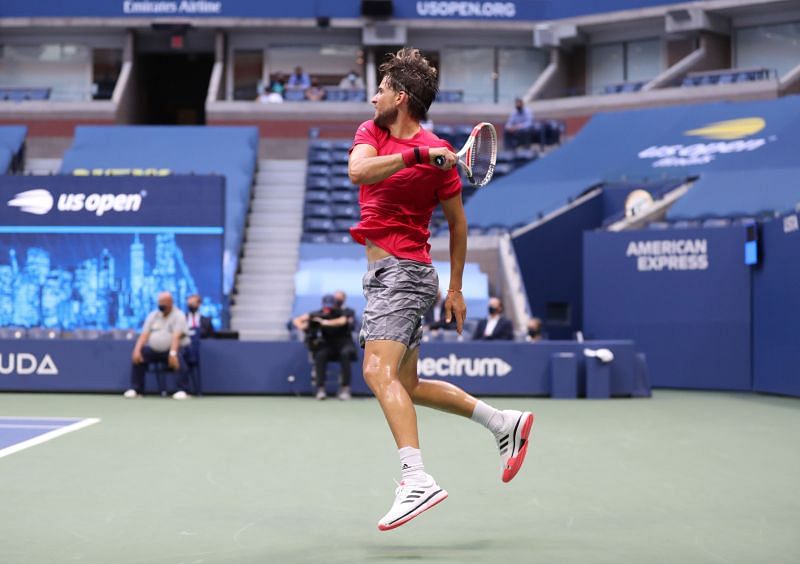
From 4-5, 30-30, Thiem uncorked three consecutive down-the-line forehand winners that seemed to elicit thunderous applause even from an empty stadium. Maybe the applause was only in our heads, or maybe the commentators screaming in disbelief gave us the impression that the stadium was on its feet. But there was no denying that Thiem's back-to-the-wall bravado was the stuff of champions.
And that's the word that Dominic Thiem ended up inscribing permanently next to his name: champion.
"Somehow the belief today was stronger than the body, and I'm super happy about that," Thiem said.
Admittedly, it was never straightforward even after that slew of winners late in the fifth set. Thiem choked while serving for it at 6-5 and again at 6-4 in the breaker, while Zverev alternated searing down-the-line backhands with puffball 68 mph serves. But the seed of doubt that Thiem had planted in the German's head with those forehands was enough to give him the decisive upper hand.
When a guy hits that big a forehand while seemingly playing on one leg, and still refuses to miss, you've got to wonder if there's anything you can do.
The match was never pretty, and it ended, fittingly, with a Zverev unforced error (of which he made 65 on the day). But it is pertinent to note that the last error came off a Thiem backhand slice - the shot that is arguably the strongest representation of the Austrian's improvement on hardcourt.
Zverev's down-the-line backhand was the most obviously impactful shot of the match, but it was Thiem's slice that did more damage, albeit in subtler ways. On a day that the Austrian's topspin backhand was well below par, his slice kept him in the rallies and also prevented Zverev from getting into his comfort zone.
The German's forehand held up longer than anyone expected, until he had to generate his own power off Thiem's slice. That's when all of his easy power disappeared in a puff of smoke.
Still, the loss ought to sting Zverev given how many chances he had to close it out. And nobody was left in any doubt exactly how much it stung; the 23-year-old spent most of the post-match presentation weeping openly.
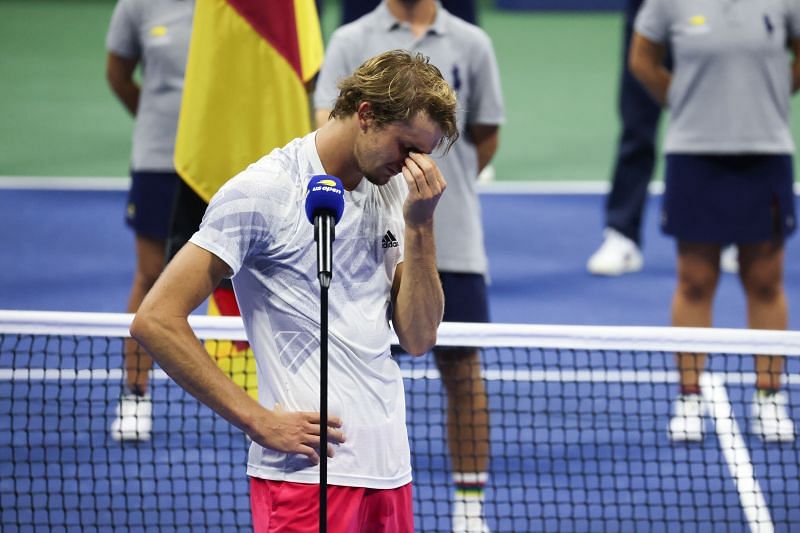
Zverev's misery was compounded by the fact that his parents have tested positive for COVID-19, a development that he announced between sobs during his speech. It was hard not to feel for him as he paid tribute to them, as well as to Thiem and pretty much everyone around him.
The moment of catharsis perfectly encapsulated the blood, toil and emotional sacrifices that players have to make in order to get to this level. And Thiem responded in kind, dedicating nearly half his speech to Zverev's efforts and his future championship-winning potential.
That future will come eventually, if the German's lights-out performance in the first set is anything to go by. Zverev still has the ability to bring his best to the big matches, even if he has stunk up the joint all tournament, and that is bound to earn him rich rewards sooner or later.
But for now, the man reaping the rewards is Dominic Thiem, who no longer has to carry the unwanted title of 'best player without a Slam'. He took the scenic route to reach the finish line, and at times looked less than deserving of the trophy, but he showed heart when it mattered. And really, that's more than what anyone can ask for after all the heartbreaks of the last couple of years.
"When I made that match point, when he missed that backhand, it was such a big relief," Dominic Thiem said. "Like Indian Wells title, for example, or like Vienna title, titles that mean so much to me, just a little bit stronger as this is a Major title. It's just the highest thing what you can achieve in tennis."
Dominic Thiem has passed the last and sternest test, and has a Slam trophy to show for it. Maybe he can stretch out his legs and lounge at the back bench for a while now; he has certainly earned that privilege.